The singularity of purpose in extraordinary experience design

Small FSR | Big Ambitions in Restaurant Design Strategy
The real key is honesty — being simple, authentic, straight forward. People seem to get that.
Meeting Danny Meyer, the legendary human brand (hospitality strategies,) I was struck by his demeanor. Humble, careful, thoughtful — and gracious. Like a host exemplar. Background on the man. But there’s something in the depth of his background that reaches back to his family. I’m reminded of Howard Schultz, in a way — they both have similar vibrations. They get to the point.
Danny spent part of his childhood traveling in Europe with his father’s tour company — then studying the nature of the hospitable in food and wine in France and Italy. That sojourn, like others we’ve written about, and worked for (Paul Bertolli) suggests a deepening of comprehension that builds character, perception and insights in how to connect with people. And at the very heart of experience in restaurant strategy, that’s where it lies. Expertise in being with people.
Working with other restauranteurs, my big question is always: “Are you going to be working here — will people see you?” That’s crucial. And it’s not infrequently, if the answers to the contrary, I’ll pass. Because the real link to the connection to guest relationships comes down to that simple proposition. Be there. Working earlier, with the Reichard brothers on The Habit, Joey Gibbons on Longhorn, or the Schwartz family on their grouping of restaurants, Brad Dickinson and Mikel Rogers on the Pearl, in every instance, the success of the presence of the brand relates to the link to the people.
Then there’s the code — the veritable brandcode — of the restaurant experience. Intriguingly, in referencing this case study on Danny Meyer’s Shake Shack is that there is a fundamental alignment between the spirit of the human brand initiative and the nature of that experience — people, their visioning, it’s that personality which makes the difference. Examining the code of Danny Meyer’s physical expression, you find honesty, humbleness, moderate details — yet the imbued characteristics of his psychic presence find themselves made evident in utility.
Simple, get it:
Merchandising Signing:
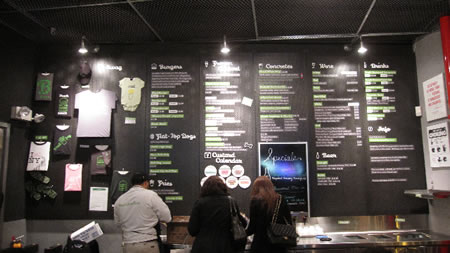
Come, get it:
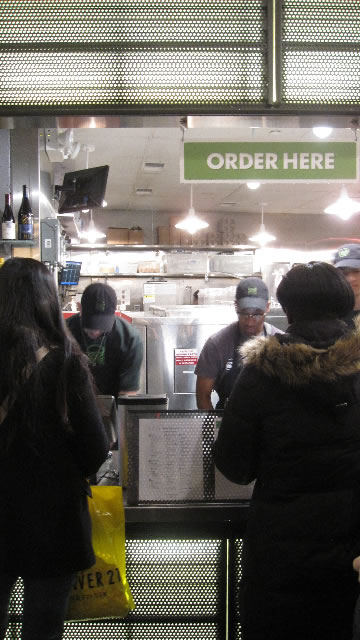
Simple, materials:
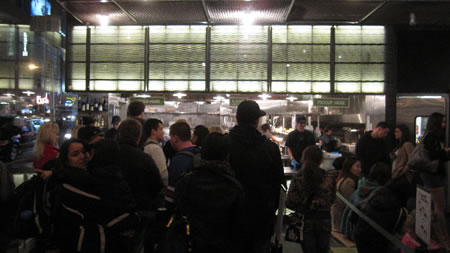
Simple, storytelling:

Simple comfort (but not too).
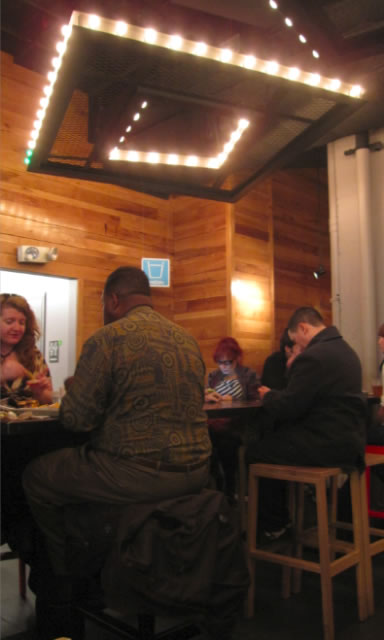
Lights, simple.
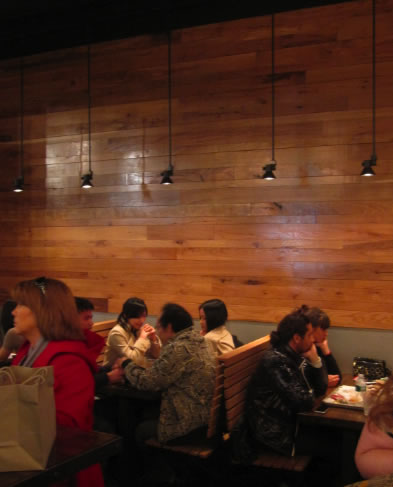
Simple: it works.
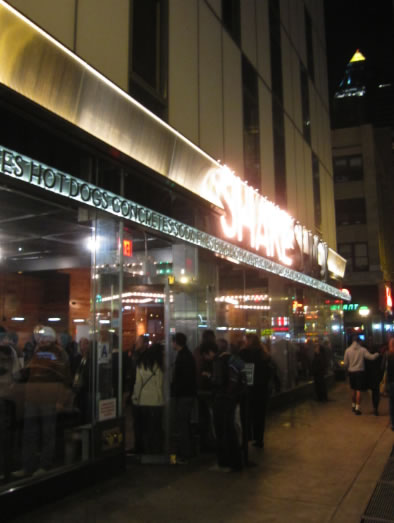
(Imagery by Dawn Clark)
Danny Meyer’s principles are entirely human focused: “good hospitality starts with a restaurant’s staff. In hiring employees, Meyer said (at a talk at Yale University,) his restaurants look for people with high ‘hospitality quotients,’ which are defined by what he referred to as six core emotional skills — kindness, curiosity, work ethic, empathy, self-awareness and integrity.”
To the Meyer strategy, employees are the highest priority — even valuing them over his customers.
“We were actually putting our staff in front of our customers,” he said. “We learned that if we really wanted to have great customer satisfaction, you would never put them first. You want to make sure that the people who are coming to work love their jobs and love working with each other so much that they are naturally going to do a better job of taking care of our guests.”
After his presentation, Meyer answered questions from the audience — and when asked to name some of his culinary heroes, Meyer did not answer with celebrity named chefs.
To his thinking, the real power of success is focus — “his heroes are people who dedicate their lives to perfecting a single type of food.”
“I just have so much respect for someone who goes deeply into one topic and is the best in the world at that one topic,” Meyer referenced during the audience question and answer discussion.
That bridging of intention reaches between the employee — and the power of that relationship to enchant the guest, but as well, the knowledge of the community (and its individuals) profiles. Seeking more — to aligning the spirit of brand intentionality isn’t a fadish trend, but more potent — following insights and relationships, “John Battallewrites in Search, the database of intentions will soon be upon us,” according to blogger and design thinker, Chris Bernard. “But you don’t need to wait for this to start employing the principles Danny details in your own business.” Bernard notes that “Danny gathers every piece of data about his customers that he can and he then uses it to enhance and personalize and experience of a customer. The more data that Danny has, the more likelihood that he can create memorable and meaningful interactions…”
Top notes from Danny Meyer:
The hospitality economy: “We are in a very new business era. I’m convinced that this is now a hospitality economy, no longer the service era. If you simply have a superior product or deliver on your promises, that’s not enough to distinguish your business. There will always be someone else who can do it or make it as well as you. It’s how you make your customers feel while using your products that distinguishes you.”
The power of experience: “It’s the experience. Service is a monologue: we decide on standards for service. Hospitality is a dialogue: to listen to a customer’s needs and meet them. It takes both great service and hospitality to be at the top.”
The center of the brand — employees: “If you are devoted to your staff and can promise them much more than a paycheck, something to believe in, you will then get the best service for customers, which will in the long run provide the best return to your investors.”
The link to knowledge: “The more dots you collect, the more chances you have to make meaningful connections that make people feel good and give you a business edge.”
Brand and emotional intelligence: “You can teach technical skills, but you can’t train employees emotionally. But you can teach managers how to hire for a specific emotional skill set.” Building his team, Meyer searches for candidates whose strengths are divided 51%-49% between emotional hospitality and technical excellence. “I like to call them hospitalitarians. People who are naturally kind, empathetic and curious, along with having a strong work ethic. They get fed through the process of providing hospitality.”
Locations for ShakeShack — a growing enterprise.
The overview on Danny Meyer’s H|Q — the hospitality quotient.
See Danny.
Simple. Service — the heart=fullness, that drives the brand. Attention and intention. And singularity of intent. Know what you love to do, to offer, and stay focused on that intention.
t i m | at the ShakeShack, store one, Madison Park, NYC
–––
HOW TO CREATE LOVE BRANDS:
Passion
the reels:http://www.youtube.com/user/GIRVIN888
girvin blogs:
http://blog.girvin.com/
https://tim.girvin.com/index.php
girvin profiles and communities:
TED: http://www.ted.com/index.php/profiles/view/id/825
Behance: http://www.behance.net/GIRVIN-Branding
Flickr: http://www.flickr.com/photos/tgirvin/
Alltop network: http://my.alltop.com/TGirvin
Google: http://www.google.com/profiles/timgirvin
LinkedIn: http://www.linkedin.com/in/timgirvin
Facebook: http://www.facebook.com/tim.girvin
Facebook Page: http://www.facebook.com/girvindesign
Twitter: http://twitter.com/tgirvin